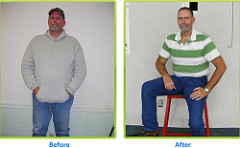How to Hide That You Are on a Diet
Although some people love to talk about their diets, you might not want the entire world to know you're dieting. Studies show that announcing your goals to others may make you less likely to accomplish that goal. The sense of satisfaction you get from publicizing your intention, such as losing weight through dieting, may in fact give you a premature sense of completion.[1] Though you can use distraction and avoidance to hide your diet, or focus on smart and healthy eating so your diet is subtle and sustainable, you should not hide your diet out of shame or guilt.[2] If you are concerned about your eating habits and are hiding your diet due to an eating disorder, you should speak to your doctor about these issues.
Steps
Method 1 Using Distraction and Avoidance
-
1
Shift the subject away from eating and dieting in conversation. If you find yourself in situations where dieting comes up as a topic of conversation when friends or coworkers, use distraction tactics to change the subject. Remark on the latest television show or the latest movies. Focus on the latest office gossip or the latest news from a mutual friend. Shifting the subject away from a discussion on eating and dieting will help you avoid having to talk about your diet or address your eating habits.
- Keep in mind it may be helpful to share your diet with close friends or family, as they can act as a form of support and encouragement. Rather than avoid the topic with people you are close with, you may want to consider being open about your diet so you can feel you are not doing it alone or out of shame.
-
2
Prepare a vague excuse. Have a vague excuse ready of someone does decide to ask you about your diet, especially if it has happened around certain individuals recently and you have had to awkwardly change the subject. This could be something like: “I’m just watching what I’m eating” or “I’m avoiding certain food groups”.
- While having a vague excuse ready can be useful, you should try not to lie when asked about your weight. For example, you may say “My doctor told me I’m allergic to carbs”, when in fact your doctor has not given you this diagnosis. Using a fake excuse could indicate that you are ashamed of your eating habits and are trying to hide your diet by lying to others.
-
3
Look at the menu in advance if you're eating out. To avoid the awkward back and forth with the server when you are at a restaurant, prepare for eating out by looking up the menu for the restaurant in advance on the restaurant's website. This way, you can look through the menu and create a meal that fulfills your dietary needs at your own pace, rather than do it on the spot in person at the restaurant.
- If you are eating out at someone's home, you may want to ask the home cook what she is planning to prepare. You may then be able to suggest certain dishes that might fit with her planned meal but still adhere to your diet. Even if the home cook does not agree to make a special meal for you, you are at least prepared for the meal and know what to expect when you sit down to eat.
-
4
Eat your meals alone or with others who are dieting. To avoid having to defend or address your diet, you may want to consider having your meals alone. This way, you will not need to hide your diet and can eat comfortably without feeling judged by others.
- Eating alone can be an isolating and unhealthy experience, especially if it is done on a daily basis for all your meals. You may want to consider instead eating around individuals who will not question your diet or ask you personal questions about your eating habits as an alternative to eating all your meals alone. This could be friends that are also dieting or individuals that you meet through a weight loss program.
-
5
See your doctor if you think you may have an eating disorder. Hiding your diet by using exaggerated excuses, spitting food into napkins, or not eating with others can all be signs of an eating disorder like bulimia or anorexia. These eating disorders are often due to associating eating with a high level of distress and anxiety. This could be due to a fear of gaining weight or to other traumas that cause intense emotions and a need to control situations through food. Other symptoms of an eating disorder include:
- Not eating any food at all.
- Cutting your food into small pieces or stalling to finish your meals.
- Eating very quickly or very slowly and then purging the food by going to the bathroom.
- Eating without utensils or with utensils that are not appropriate for the meal.
- Exercising intensely after every meal.
- Obsessively counting calories and monitoring your eating habits.
- If you think you may be developing an eating disorder, you should reach out to close friends and family. You should also consider getting professional help from a doctor or a therapist that specializes in eating disorders.
Method 2 Using Smart and Healthy Eating
-
1
Drink lots of water. Drinking water will not only keep you healthy and hydrated, it can also act as an appetite suppressant. Sip lots of water throughout the day to prevent your stomach from becoming completely empty, leading to high hunger levels and the need to eat. By drinking lots of water, you can focus on staying hydrated, rather than on your diet.[3]
- You should also drink a glass of water before you eat so your stomach feels more full and you can then eat smaller portions during your meal. This can help you to diet in a healthier way.
-
2
Carry small snacks with you in your bag. Be a smart eater by packing small snacks in your bag that you can reach for inconspicuously throughout the day. This will allow you to stay full without eating empty calories. It will also make others less curious about your diet, as you will appear to be eating often throughout the day via snacking.
- Snacks like raw almonds, dark chocolate, and sugar-free granola bars can help to keep you full and give you energy between meals. You can also cut up fruits like apples, pears, and bananas for healthy snacks that won’t lead to a sugar crash later in the day.
-
3
Plan out your meals in advance. Distracted and unplanned eating has been proven to lead to weight gain and unsuccessful dieting. Avoid unplanned meals or distracted eating by planning out your meals for the week. Go shopping at the start of the week, or on the weekend if you work during the week, so you have all the necessary ingredients to make healthy meals for yourself at home that adhere to your diet.
- You may organize your meals based on a certain calorie intake per day or a weight loss goal. Try to plan your meals around your required calorie intake per day, which is based on your age, weight, and your level of physical activity. Remember that everyone will have different calorie intakes and no one diet can fulfill everyone’s dietary needs.
-
4
Practice mindful eating. Another key component to practicing healthy eating habits is being aware of how you eat, as well as what you eat. Many people tend to eat in front of the television or a distraction and do not pay attention to how much they are eating. Rather than eat in front of the television, try to sit down and focus on your food as you eat, taking your time to savor the food. This will allow you to swallow and digest each bite, and keep track of how much you are eating.[4]
- To practice mindful eating, use a timer when you sit down to eat. Set the timer to 20 minutes and try to use all of the available time to eat one meal.
- You can try to eat with your non-dominant hand so you are forced to slow down when you eat and make some effort to lift and chew every bite. You can also reflect on what was required to produce the meal, such as the butcher who prepared the meat or the farmer who grew the vegetables and the grains.
-
5
Avoid caffeine and alcohol. Though you may need your morning coffee to get through the day, having too much caffeine through coffee, caffeinated teas, or energy drinks can lead to feelings of hunger and fatigue. This could then cause you to cheat on your diet or eat an unplanned meal. As well, alcohol can lead to hunger and unhealthy eating, especially at night when you’ve been drinking for several hours.
- If you tend to drink lots of coffee or enjoy a few drinks on occasion, try to have a glass of water between each cup of coffee or each drink. This will keep you hydrated and help to limit your hunger pangs.
-
6
Talk to your doctor if you think you may be developing an eating disorder. If you cannot maintain healthy eating habits and feel as though your dieting has gotten out of control, you may want to speak to your doctor about eating disorders. Eating disorders like bulimia and anorexia are often due to associating eating with anxiety or distress. Many individuals develop eating disorders every year due to a fear of gaining weight or to intense emotions that lead to a need for control through food and eating. Other symptoms of an eating disorder include:
- Not eating any food at all.
- Cutting your food into small pieces or stalling to finish your meals.
- Eating very quickly or very slowly and then purging the food by going to the bathroom.
- Eating without utensils or with utensils that are not appropriate for the meal.
- Exercising intensely after every meal.
- Obsessively counting calories and monitoring your eating habits.
- If you think you may be developing an eating disorder, reach out to close friends and family. You may also benefit from professional help from a doctor or a therapist that specializes in eating disorders.
-
7 Quick Weight Loss Diet Tips And Ways
For some people, obesity becomes a serious cause of concern, thus aff
-
7 Quick Healthy Weight Loss Tips
When you want to loose weight you need to make sure that you do it th
-
Weight Loss: Stop Searching For The Perfect Diet Plan And Get Started Today
There are so many different diets available today people often have n
-
Weight Loss Tip #115: Pump up your protein intake
-
Common Sense Healthy Weight Loss Plan
The weight loss industry is big business these days. Everywhere you g
-
The Most Weight You Can Safely Lose In A Month By Only Changing Your Diet—And 9 Simple Strategies To Get You Started
So, how much weight can you safely lose in a month by changing only yo
- DON'T MISS
- Proactol - Read On If You Would Like To Lose Weight And Look Your Best
- African Mango Does It Work To Achieve A Perfect Weight Loss?
- The Newly Discovered Virus Living In The Guts Of Half The Worlds Population
- Lose Fat Not Muscle
- Hip Replacement Surgery Helped This Woman Lose 45 Pounds—And Changed Her Life
- Want To Lose Weight? Read On For More!
- Stop Eating Meat to Lose Weight?
- Easy Weight Loss: 3 Practical Tips That Work
- Here Is The Best Way To Loose Weight Fast And Live A Healthy Life
- Manage Your Weight Safely And Effectively With These Tips




